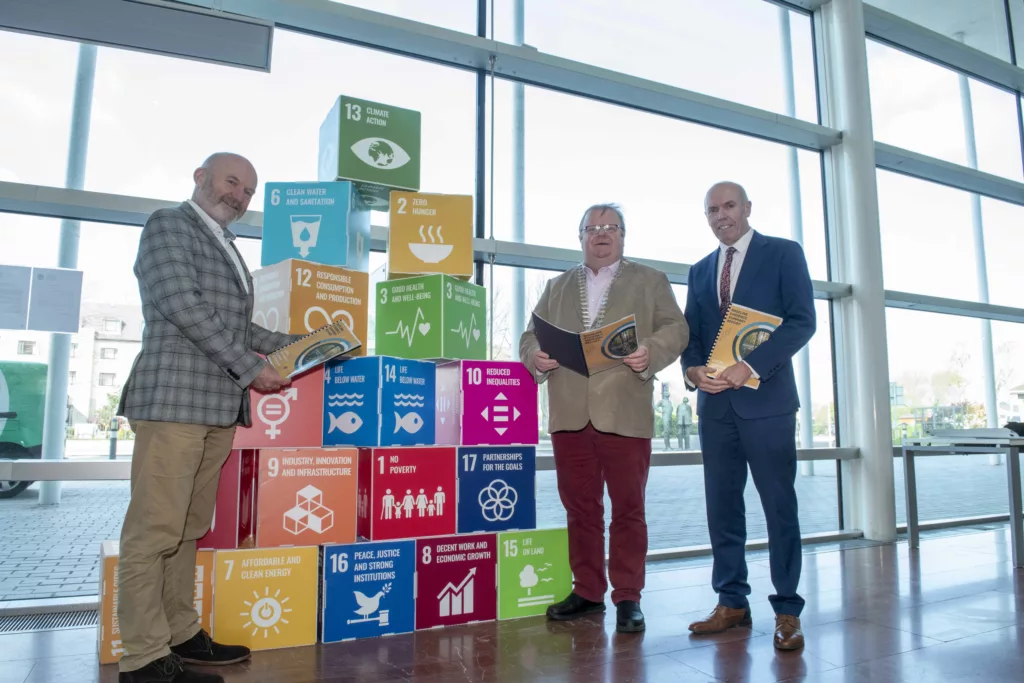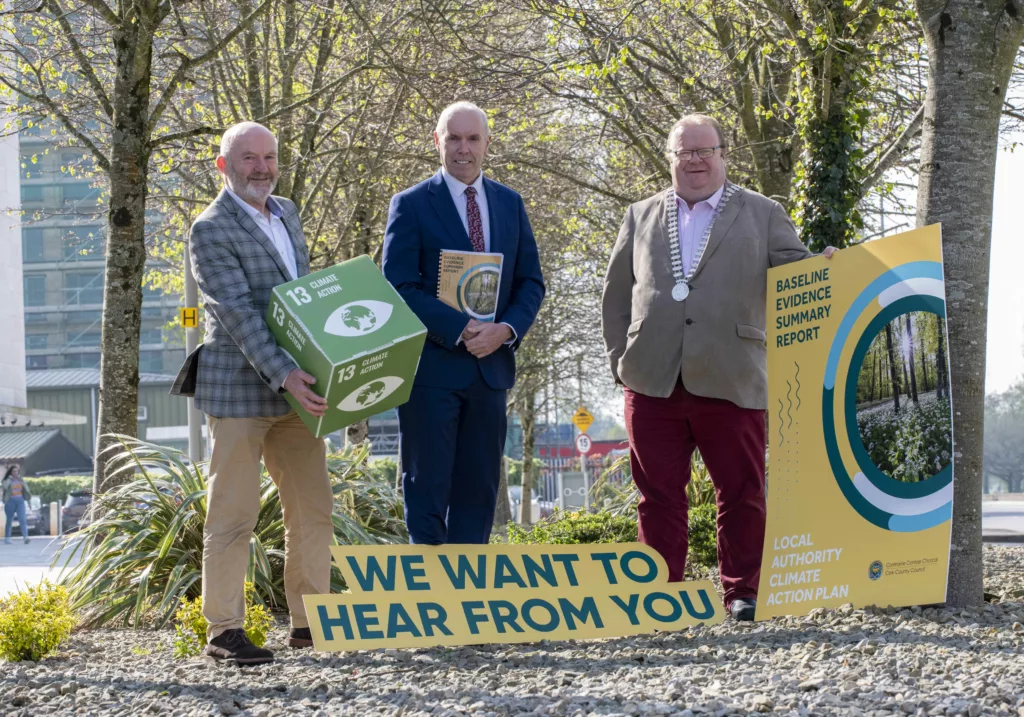28 April 2023
By Tom Collins
tom@TheCork.ie
Cork County Council is seeking public engagement on the first stage of a new Climate Action Plan for the county. The consultation will inform how we can best tackle the challenges posed by our changing climate, while working to meet national targets for reductions in greenhouse gas emissions.

Mayor of the County of Cork, Cllr Danny Collins, Chief Executive of Cork County Council Tim Lucey and Cork County Council’s Director of Services for Environment Louis Duffy have launched the public consultation on a new Climate Action Plan for Cork County. The Council is asking for public engagement on formulating a strategy to help mitigate against the risks posed to County Cork by climate change. Visit www.CorkCoCo.ie for more.
Pic: Brian Lougheed

Mayor of the County of Cork, Cllr Danny Collins, Chief Executive of Cork County Council Tim Lucey and Cork County Council’s Director of Services for Environment Louis Duffy have launched the public consultation on a new Climate Action Plan for Cork County. The Council is asking for public engagement on formulating a strategy to help mitigate against the risks posed to County Cork by climate change. Visit www.CorkCoCo.ie for more.
Pic: Brian Lougheed
Cork County Council has published a Baseline Evidence Summary Report which contains Baseline Emission Inventory information and also examines how the climate in County Cork has changed in recent decades, while also showing the risks of impact that future climate change may cause.
Findings include;
- sea levels in the Cork Harbour area have risen by approximately 40cm since 1842
- annual average rainfall at Cork Airport increased by 3% between 1981-2010, compared to the same period 1961-1990
- the Rosscarbery flood of 2020 involved 230mm of rainfall, the highest recorded since 1961
The report also predicts an increase in the average temperature of between 1.1 and 1.5 degree celsius for Cork County by 2050, resulting in an increase in heatwaves and droughts. Coastal flooding and erosion is likely to become more frequent, unless action is taken to reduce emissions.
The report was presented to Full Council on Monday, April 24th by the Mayor of the County of Cork, Cllr Danny Collins.
Cllr Collins is asking for public engagement on this important matter and for everyone’s voice to be heard, “We are encouraging everyone to get involved so that communities, bodies, groups and other stakeholders can be part of the development of our Climate Action Plan. Cork County Council recognises the wealth of local information throughout the county and we want to work together to gather as much information as possible to ensure that we all play our part in supporting our county’s climate ambitions”.
Cork County Council expects to use its influence as a local authority to lead the fight against climate change with direct support from the people living in County Cork.
The final plan, when published, will show how the Council can work to influence, facilitate and coordinate the climate actions of communities and other stakeholders.
Members of the public are being asked to make submissions on how the Council can best transition to a climate resilient, biodiversity rich, environmentally sustainable and climate-neutral economy.
Chief Executive of Cork County Council, Tim Lucey highlighted “Climate change is one of the biggest challenges facing our citizens, and one in which everyone bears a responsibility to do their part for future generations. The development of this Climate Action Plan marks a new chapter for our climate ambitions which will allow us to build on the large amount of work already underway and create a specific Climate Action Plan for Cork County, reflecting national climate objectives but making them real at a local level.”
The Baseline Evidence Summary report is available online at www.corkcoco.ie. Submissions can also be made to Sunday 21st May inclusive.
Cork County Council is required by statute to adopt the plan before the 24th of February 2024.
Cork County Climate Change in numbers
- Sea levels in the Cork Harbour area have risen by approx 40 cm since 1842
- 230 mm of rain fell during the 2020 Rosscarbery flood, the highest recorded since 1961
- Four of the hottest summers recorded were in the last 10 years, based on records extending back to 1961
- The highest temperature on record was 31.6C on June 18th, 2018 at Glengarriff
- There have been 15 extreme weather events since 2017 including Hurricane Ophelia, Storm Emma and five separate heatwaves.
Projected Climate Changes for Cork County by 2050
- Projected overall increase in average temperatures between 1.1 and 1.5C
- Heatwaves expected to occur on an almost annual basis for some parts of the county
- Summer rainfall is expected to reduce by between 5 and 15% when compared to the years 1981 and 2000, increasing the potential for drought
- Sea levels to increase by up to 0.26m by 2050 increasing the likelihood of coastal flooding and coastal erosion
- The frequency of heavy rainfall days (rainfall of more than 30mm), to increase by up to 52% in some areas of County Cork leading to more river and surface water flooding
- The annual snowfall in the region is expected to decrease substantially by the middle of the century
Cork County Council’s goals and objectives
Built Environment and Infrastructure
- To reduce the council’s impact on climate change
- To enhance the resilience of transport infrastructure, council assets and housing stock
Community Resilience and Transition
- To build capacity within communities to deliver climate action
- To integrate climate action considerations in land use planning
Governance
- To support the development and implementation of climate actions across all council activities and operations
- To work and collaborate with other sectors and agencies to deliver programmes that support climate action
Natural Environment and Green Infrastructure
- To maintain and enhance the natural assets of Cork County
- To harness Cork County’s natural assets to contribute to resilience and low carbon
The population of Cork County is expected to increase by 66,000 by 2031 and the number of people over 65 is expected to increase to over 93,000 by 2041. ‘As a result, an increasing population will be exposed to climate hazards resulting in a growing level of impact on Cork County both in terms of people affected and economic value of damages created.’
